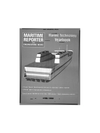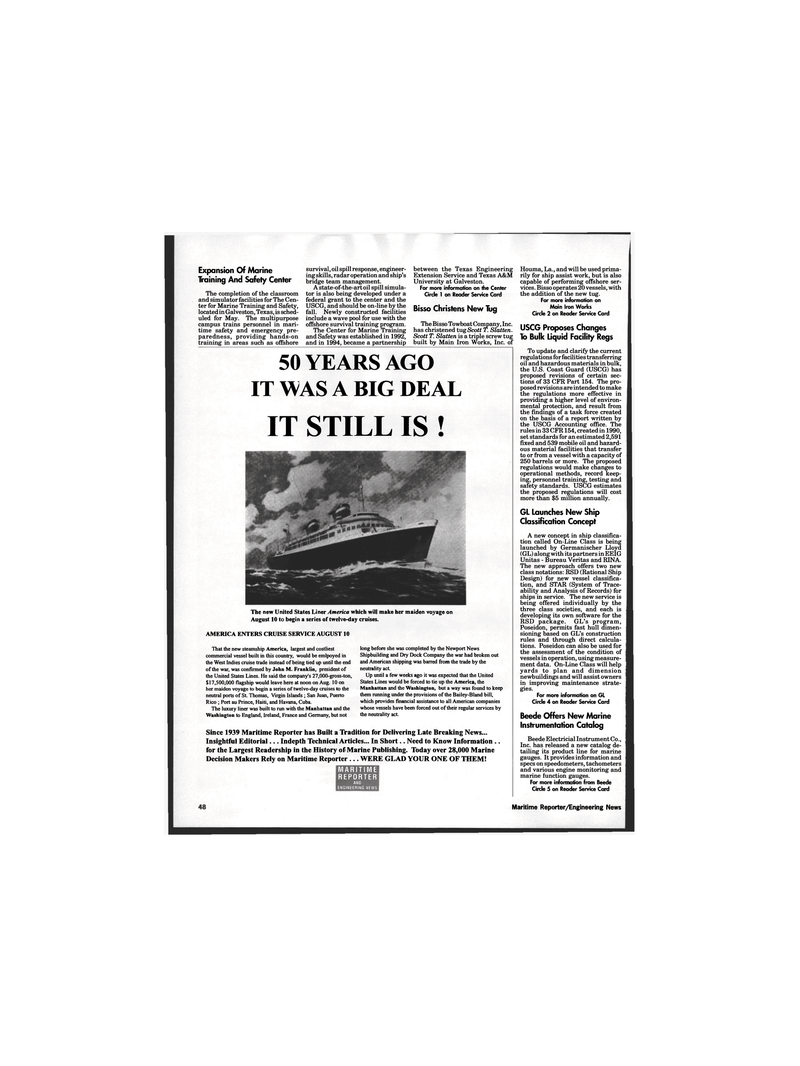
Page 40: of Maritime Reporter Magazine (April 1995)
Read this page in Pdf, Flash or Html5 edition of April 1995 Maritime Reporter Magazine
Expansion Of Marine
Training And Safety Center
The completion of the classroom and simulator facilities for The Cen- ter for Marine Training and Safety, located in Galveston, Texas, is sched- uled for May. The multipurpose campus trains personnel in mari- time safety and emergency pre- paredness, providing hands-on training in areas such as offshore survival, oil spill response, engineer- ing skills, radar operation and ship's bridge team management.
A state-of-the-art oil spill simula- tor is also being developed under a federal grant to the center and the
USCG, and should be on-line by the fall. Newly constructed facilities include a wave pool for use with the offshore survival training program.
The Center for Marine Training and Safety was established in 1992, and in 1994, became a partnership between the Texas Engineering
Extension Service and Texas A&M
University at Galveston.
For more information on the Center
Circle 1 on Reader Service Card
Bisso Christens New Tug
The Bisso Towboat Company, Inc. has christened tug Scott T. Slatten.
Scott T. Slatten is a triple screw tug built by Main Iron Works, Inc. of
Houma, La., and will be used prima- rily for ship assist work, but is also capable of performing offshore ser- vices. Bisso operates 20 vessels, with the addition of the new tug.
For more information on
Main Iron Works
Circle 2 on Reader Service Card
USCG Proposes Changes 10 Bulk Liquid Facility Regs
To update and clarify the current regulations for facilities transferring 011 and hazardous materials in bulk, the U.S. Coast Guard (USCG) has proposed revisions of certain sec- tions of 33 CFR Part 154. The pro- posed revisions are intended to make the regulations more effective in providing a higher level of environ- mental protection, and result from the findings of a task force created on the basis of a report written by the USCG Accounting office. The rules in 33 CFR 154, created in 1990, set standards for an estimated 2,591 fixed and 539 mobile oil and hazard- ous material facilities that transfer to or from a vessel with a capacity of 250 barrels or more. The proposed regulations would make changes to operational methods, record keep- ing, personnel training, testing and safety standards. USCG estimates the proposed regulations will cost more than $5 million annually.
GL Launches New Ship
Classification Concept
A new concept in ship classifica- tion called On-Line Class is being launched by Germanischer Lloyd (GL) along with its partners in EEIG
Unitas - Bureau Veritas and RINA.
The new approach offers two new class notations: RSD (Rational Ship
Design) for new vessel classifica- tion, and STAR (System of Trace- ability and Analysis of Records) for ships in service. The new service is being offered individually by the three class societies, and each is developing its own software for the
RSD package. GL's program,
Poseidon, permits fast hull dimen- sioning based on GL's construction rules and through direct calcula- tions. Poseidon can also be used for the assessment of the condition of vessels in operation, using measure- ment data. On-Line Class will help yards to plan and dimension newbuildings and will assist owners in improving maintenance strate- gies.
For more information on GL
Circle 4 on Reader Service Card
Beede Offers New Marine
Instrumentation Catalog
Beede Electricial Instrument Co.,
Inc. has released a new catalog de- tailing its product line for marine gauges. It provides information and specs on speedometers, tachometers and various engine monitoring and marine function gauges.
For more information from Beede
Circle 5 on Reader Service Card 50 YEARS AGO
IT WAS A BIG DEAL
IT STILL IS !
The new United States Liner America which will make her maiden voyage on
August 10 to begin a series of twelve-day cruises.
AMERICA ENTERS CRUISE SERVICE AUGUST 10
That the new steamship America, largest and costliest commercial vessel built in this country, would be emlpoyed in the West Indies cruise trade instead of being tied up until the end of the war, was confirmed by John M. Franklin, president of the United States Lines. He said the company's 27,000-gross-ton, $17,500,000 flagship would leave here at noon on Aug. 10 on her maiden voyage to begin a series of twelve-day cruises to the neutral ports of St. Thomas, Virgin Islands ; San Juan, Puerto
Rico ; Port au Prince, Haiti, and Havana, Cuba.
The luxury liner was built to run with the Manhattan and the
Washington to England, Ireland, France and Germany, but not long before she was completed by the Newport News
Shipbuilding and Dry Dock Company the war had broken out and American shipping was barred from the trade by the neutrality act.
Up until a few weeks ago it was expected that the United
States Lines would be forced to tie up the America, the
Manhattan and the Washington, but a way was found to keep them running under the provisions of the Bailey-Bland bill, which provides financial assistance to all American companies whose vessels have been forced out of their regular services by the neutrality act.
Since 1939 Maritime Reporter has Built a Tradition for Delivering Late Breaking News-
Insightful Editorial... Indepth Technical Articles... In Short.. Need to Know Information .. for the Largest Readership in the History of Marine Publishing. Today over 28,000 Marine
Decision Makers Rely on Maritime Reporter ... WERE GLAD YOUR ONE OF THEM!
MARITIME
REPORTER
AND
ENGINEERING NEWS 42 Maritime Reporter/Engineering News

 39
39

 41
41
